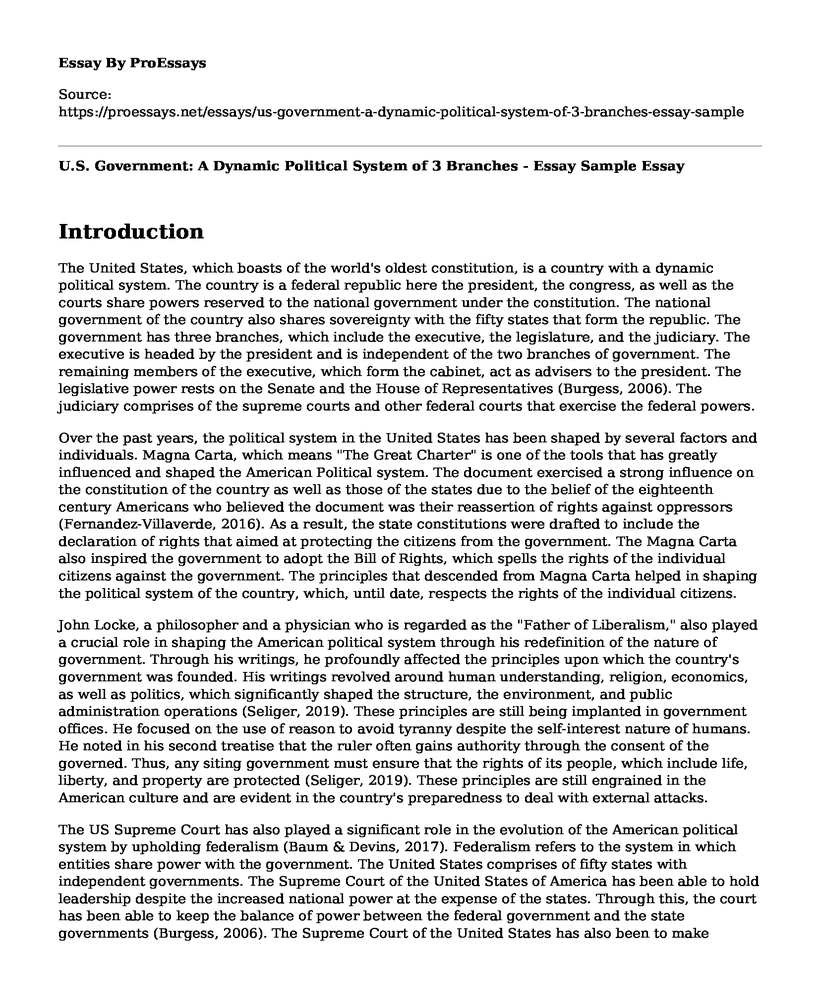Introduction
The United States, which boasts of the world's oldest constitution, is a country with a dynamic political system. The country is a federal republic here the president, the congress, as well as the courts share powers reserved to the national government under the constitution. The national government of the country also shares sovereignty with the fifty states that form the republic. The government has three branches, which include the executive, the legislature, and the judiciary. The executive is headed by the president and is independent of the two branches of government. The remaining members of the executive, which form the cabinet, act as advisers to the president. The legislative power rests on the Senate and the House of Representatives (Burgess, 2006). The judiciary comprises of the supreme courts and other federal courts that exercise the federal powers.
Over the past years, the political system in the United States has been shaped by several factors and individuals. Magna Carta, which means "The Great Charter" is one of the tools that has greatly influenced and shaped the American Political system. The document exercised a strong influence on the constitution of the country as well as those of the states due to the belief of the eighteenth century Americans who believed the document was their reassertion of rights against oppressors (Fernandez-Villaverde, 2016). As a result, the state constitutions were drafted to include the declaration of rights that aimed at protecting the citizens from the government. The Magna Carta also inspired the government to adopt the Bill of Rights, which spells the rights of the individual citizens against the government. The principles that descended from Magna Carta helped in shaping the political system of the country, which, until date, respects the rights of the individual citizens.
John Locke, a philosopher and a physician who is regarded as the "Father of Liberalism," also played a crucial role in shaping the American political system through his redefinition of the nature of government. Through his writings, he profoundly affected the principles upon which the country's government was founded. His writings revolved around human understanding, religion, economics, as well as politics, which significantly shaped the structure, the environment, and public administration operations (Seliger, 2019). These principles are still being implanted in government offices. He focused on the use of reason to avoid tyranny despite the self-interest nature of humans. He noted in his second treatise that the ruler often gains authority through the consent of the governed. Thus, any siting government must ensure that the rights of its people, which include life, liberty, and property are protected (Seliger, 2019). These principles are still engrained in the American culture and are evident in the country's preparedness to deal with external attacks.
The US Supreme Court has also played a significant role in the evolution of the American political system by upholding federalism (Baum & Devins, 2017). Federalism refers to the system in which entities share power with the government. The United States comprises of fifty states with independent governments. The Supreme Court of the United States of America has been able to hold leadership despite the increased national power at the expense of the states. Through this, the court has been able to keep the balance of power between the federal government and the state governments (Burgess, 2006). The Supreme Court of the United States has also been to make rulings in favor of federalism, which has significantly hemmed the power of the national government of the United States, consequently having an impact on the political style of the country.
References
Baum, L., & Devins, N. (2017). Federalist Court: How the Federalist Society Became the De Facto Selector of Republican Supreme Court Justices. Slate (January 31, 2017).
Burgess, M. (2006). Comparative federalism: theory and practice. Routledge. ISBN-13: 978-0415364553
Fernandez-Villaverde, J. (2016). Magna Carta, the rule of law, and the limits on government. International Review of Law and Economics, 47, 22-28. https://doi.org/10.1016/j.irle.2016.05.006
Seliger, M. (2019). The liberal politics of John Locke. Routledge
Cite this page
U.S. Government: A Dynamic Political System of 3 Branches - Essay Sample. (2023, May 11). Retrieved from https://proessays.net/essays/us-government-a-dynamic-political-system-of-3-branches-essay-sample
If you are the original author of this essay and no longer wish to have it published on the ProEssays website, please click below to request its removal:
- Homelessness in the United States Paper Example
- Macroeconomic Policy Lessons From the Financial Crisis Paper Example
- This Is Nigeria by Falz Essay Example
- Representational Roles and Legislative Leaders Paper Example
- Civil War in America Essay Example
- US Senators and Congressmen: Five Duties Explained - Essay Sample
- Essay Sample on U.S. Farmers Increase Crop Production to Meet Food Demand







